Issue 11 : 5 August 2018
Talofa Lava, Kia Orana, Malo E Leilei, Tena Koutou, Hello ...
... and welcome to the latest issue of “For The Love Of The Game”, the official e-zine of the New Zealand Amateur Sport Association Inc. We hope you enjoy reading the articles below.
If you have any feedback on this issue, ideas for future articles, or would like to contact the Editor, please click here. And, you are invited to forward the e-zine to others you know, who may be interested in reading it.
If you are interested in applying for membership of the Association, please click here.
Association Supports Wellington Club Finals ...
On Saturday 4 August, the Association was pleased to be in attendance at the Wellington Rugby Football Union’s Club Finals Day, held at the famous Petone Recreation Ground. Eight finals were played in a true celebration of community amateur sport.
The Petone Recreation Ground has been used for community sport in the Wellington region since 1898, the year that the Wellington Rugby Union were first permitted by the Petone Borough Council to use the facility.
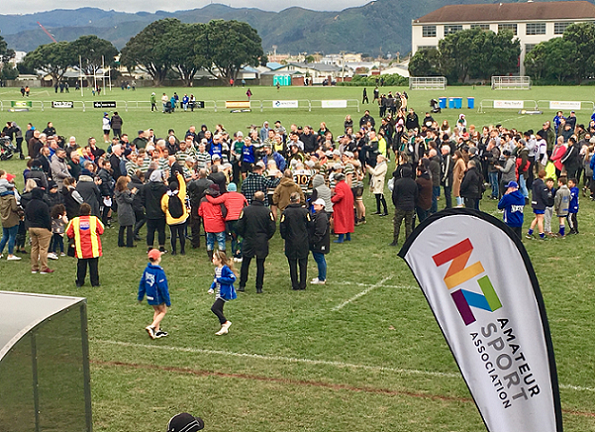
The establishment of “recreation grounds” was a fundamental public works objective as part of the colonial settlement of New Zealand in the mid-nineteenth century.
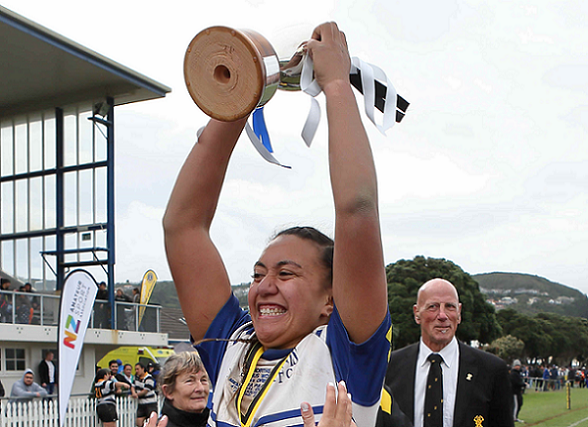
(Northern United won the Division 1 Women's title - photo courtesy of Mike Lewis)
Importantly, such grounds were not established for the exclusive use of specific sporting codes, with cycling, cricket, soccer, hockey, athletics and harriers (in addition to rugby union), all using the Petone Recreation Ground as a venue over its 120 year history. In general, public recreation grounds were leased to amateur sporting codes by local Councils, who also received a percentage of the gate-takings for specific sporting events.
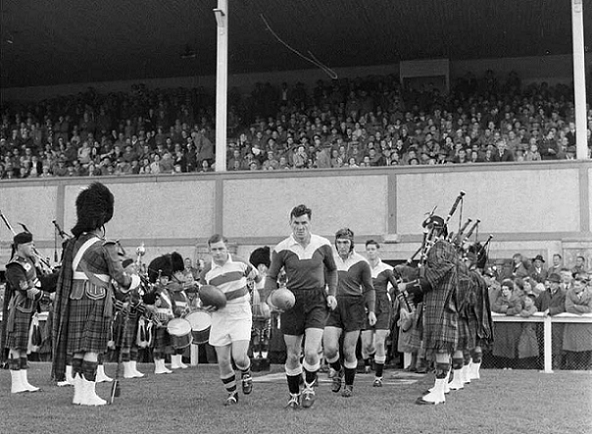
(The Petone Recreation Ground Grandstand, packed for a McBain Shield match, in 1959)
Hurricanes Youth Rugby Council Joins Association ...
The Association welcomes the Hurricanes Youth Rugby Council as its newest Regional Sports Body member. The Council was formed in 2006 as the body responsible for the administration of age-group representative rugby across the eight Provincial Unions comprising the Hurricanes Region (East Coast, Hawkes Bay, Horowhenua-Kapiti, Manawatu, Poverty Bay, Wairarapa-Bush, Wanganui and Wellington).
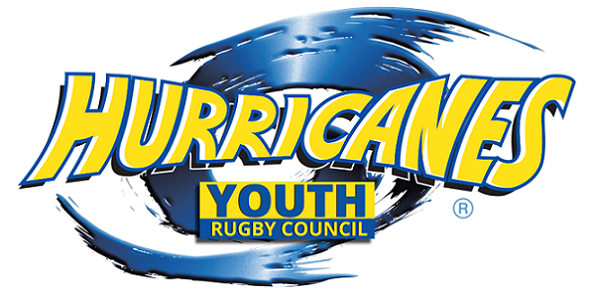
The Council is governed by an Executive Board comprising two representatives from each of the member Provincial Unions and one member representing Hurricanes GP Limited, with whom the Council has a close relationship.
The Association looks forward to working with the Council as it continues to encourage and promote youth and secondary school rugby union, within the Hurricanes region.
Is eSport The Future Of Sport? …
A little over two years ago, the New Zealand eSports Federation was incorporated to promote the social, health and educational benefits of eSports (including the importance of a healthy and balanced lifestyle) and to advocate for the recognition of eSports as an indoor sport and its inclusion in the Olympic Games.
According to one definition, “eSports [are] organised video gaming events or tournaments that culminate in championships at regional and international level, in which professional and amateur players compete against one another”.
But is eSport, really sport?
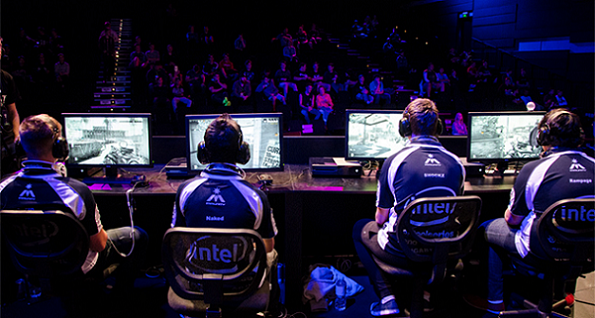
(Just under a third of eSport fans consider eSport should become an Olympic sport)
The dictionary definition of sport is “an activity involving physical exertion and skill in which an individual or team competes against another, or others, for entertainment.” The existence (or absence) of physical exertion in eSports may suggest an answer to that question.
A recent survey of eSport fans by Neilsen (a global consumer research company), has revealed that 7 in 10 eSport fans are male. Fans of eSport tend to be followers of sports which have popular video game franchises, (specifically, soccer, NFL, NBA, boxing and motorsport).
You can read Neilsen's survey, by clicking here.
According to statista.com, by 2020 the eSports market is expected to generate over US$1.48 billion in revenues, from betting, prize pools and tournaments, and from sponsorship and advertising. In terms of revenue, Asia is the biggest eSports market overall.
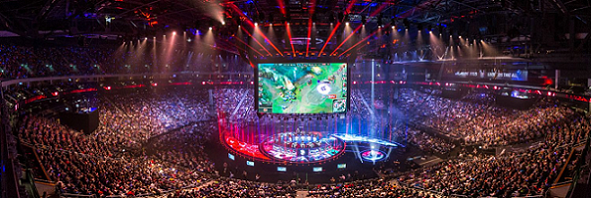
(Half of those who consider themselves eSport fans, consider eSport to be an actual sport)
Where Elite Development Counters Social Development ...
One of the greatest disincentives to teenage players (of any sporting code), is the focus on elite player development at a point in their personal social development when “being part of the game”, is more important than “being a star of game”.
Perhaps the sporting code where this effect has been most pronounced in New Zealand is Rugby League, where Auckland Rugby League chairman, Cameron McGregor, recently noted that "over the last five years there's been 800 players out of New Zealand register with Australian clubs. About 60 per cent of them would be Auckland players ... aged 14 to 20.”
The Sydney Morning Herald reported that Rugby League in New Zealand is losing teenagers at a younger age each year, as the game's “talent scouts and agents narrow their focus on the increasing band of Polynesians playing in the NRL [National Rugby League]”.
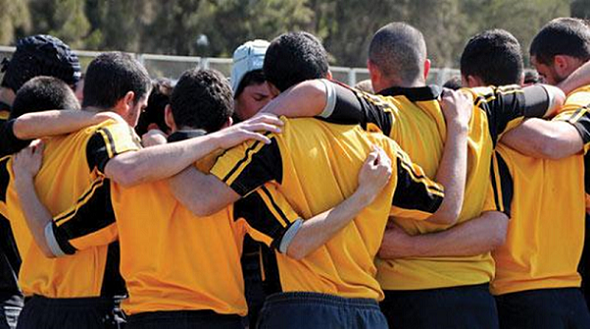
("Social knowledge" gained in sport, can be exchanged for "socioeconomic success" in life)
In the case of the NRL Clubs (under minimum-age guidelines which have been in place for six years) teenagers and their families are allowed to enter into contracts with Clubs from January 1, in the year they turn 15. That is now being proposed to increase, to the age of 17, which is viewed as a positive step by many.
As previously communicated, this Association believes that young people in sport should be protected against economic exploitation and against any work likely to harm their safety, health or physical, mental, moral or social development, or to jeopardise their education.
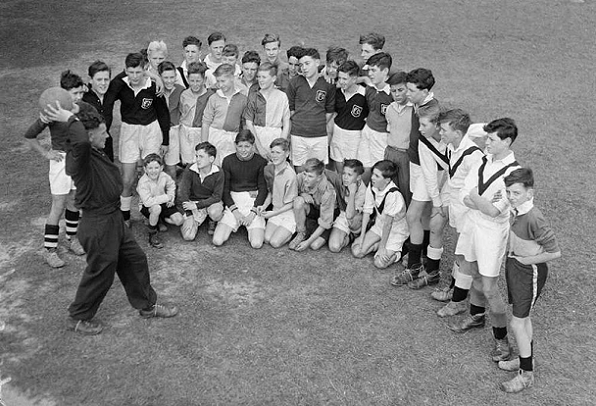
(Being "part of the game", is more important than being a "star of the game")
Catching-Up With Hamish Bond ...
Association Founding Member Hamish Bond is currently preparing for the World Championships in Colorado, in the United States. The Editor caught up with Hamish at home in Cambridge last week and asked him a few questions about his sporting (and family) life.
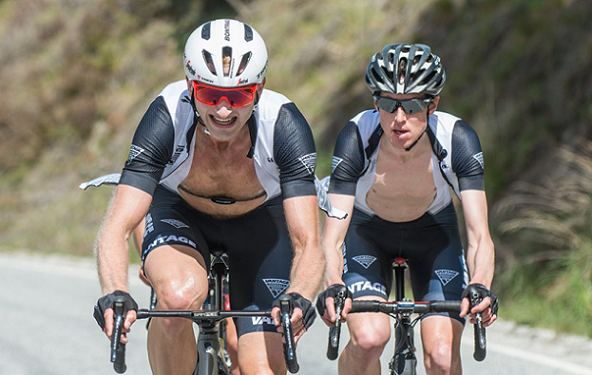
You’re currently training for the World Championships at high-altitude; what motivates you to maintain the gruelling training required?
“I think the primary motivation comes from the quest to know what you are really capable of as an athlete. On the back of that, I know that to put myself in that position it is the daily grind and consistency in training that will give me the best chance of discovering my true athletic potential. I do also like winning and proving doubters wrong! Obviously my current endeavour is a massive peak to try and ascend in a short space of time so you have to take some satisfaction from the journey as well.”
Being an elite sportsperson takes many sacrifices; does this impact on your enjoyment?
"You can look at the sacrifices, but I think it is a far more positive mind-set to identify that what I'm doing is my choice and nobody is forcing me to do it. If I'm too worried about the 'sacrifices', then I could simply make another choice and stop! In saying that, you think more about how your choices affect others, especially now I have a young daughter that you are essentially choosing to spend time away from. That is a harder choice/sacrifice to make."
You’re known and respected for setting challenging goals – and achieving them; after cycling and rowing, are there any other sports you’d like to try your hand at?
"I actually do look forward to participating in sport purely for the enjoyment and satisfaction of it. Given the nature of elite sport is near impossible for it not to feel like a job on occasion. I haven't played a team sport for years so it might be nice to get into something a bit more social, perhaps with some team-mates! I also think maybe I'd like to complete an ironman, just for the experience, but I think I would find it hard not to take a step back from trying to complete it to the upmost of my ability."
You’ve recently become a Dad for the first time; how is the busy "Bond Team" at home coping with the demands of family life?
"I did think I was pretty busy before Imogen arrived, but she just makes you take a step back and appreciate what is really important in life. I guess you just have to manage your time well and get good at prioritising ... what needs attention now and what tin-can can be kicked down the road a little! I figure you can't be perfect all the time but it is what you do most of the time that really counts."
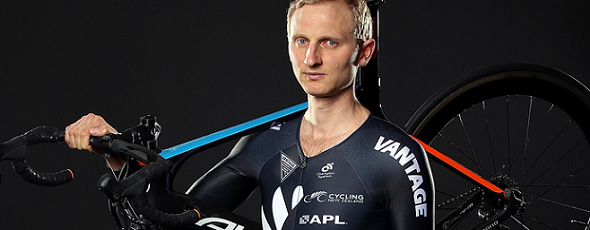
From The Archives ...
AMATEUR SPORTS CLUB
AUCKLAND STAR, VOLUME XXIX, ISSUE 253, 26 OCTOBER 1898
"A meeting of delegates from amateur bodies interested in the formation of an amateur sports club was held in the Metropolitan Hotel last evening at seven o'clock, Mr J. Marshall, President of the A.A.A. and C.C., in the chair.
There was a large and representative attendance at this meeting, all branches of sport being included. The bodies given as willing to affiliate were the Rugby Union, Cricket Association, Amateur Athletic and Cycle Club, Swimming Association and Auckland Yacht Club. It was decided that all those present should be foundation members, and names handed in within the next fortnight, if elected by the committee, to be original members.
About 80 names were handed in.”
John Marshall was born in a small cottage situated in Albert Street in 1848, the son of Alexander and Mary. Marshall was keenly interested in sport of all kinds. He was Vice-President of the Auckland Swimming Association at its foundation, and in his youth was interested in rowing, as well as yachting. He was one of the founders of the Auckland Amateur Athletic Association and as noted above, the inaugural President of the Auckland Sports Club. Marshall was for a long time also President of the Auckland Athletic Club, Auckland Rowing Club and the Rowing Association. John Marshall died in 1930 at the age of 81.
Originally based in His Majesty’s Arcade, the Auckland Sports Club was re-located to the fourth floor of the new Lewis Eady Building at 190 Queen Street in 1928, which is now a Historic Place Category 2 building, meaning it is a place of historical or cultural heritage significance or value.
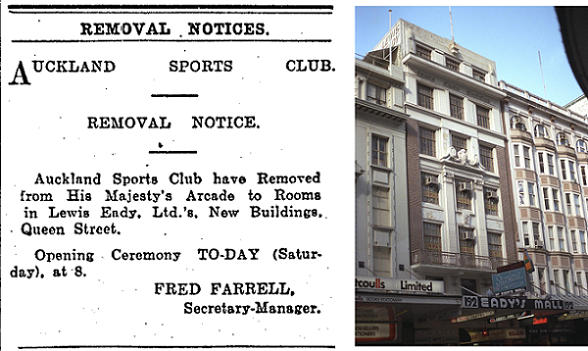
The Final Word ...
"Sport is and should remain a great school of life that supports young people in their personal development. It teaches respect for others and also for oneself."
(Richard Attias)